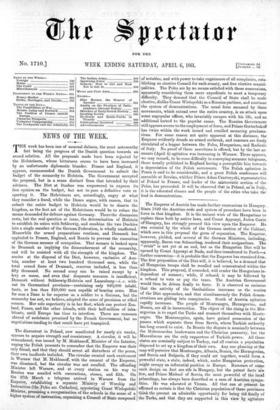The discontent in Poland, now manifested for nearly six weeks,
appears to acquire strength and consistency. A circular, it will be remembered; was issued by M. Mukhanoff, Minister of the Interior, urging the Polish peasants to remember that the Emperor was their only friend, and that they should arrest all disturbers of the peace, their own landlords included. The circular created such excitement in Warsaw that M. Mukhanoff, with the consent of the Emperor, was dismissed, but the circular was not recalled. The offending Minister left Warsaw, and at every station on his way to Breslau was assailed with execrations, stones, and filth. On the 27th March a telegram arrived in Warsaw from the Emperor, establishing a separate Ministry of Worship and Instruction (the Poles are Catholics), appointing Count Wielopolski Minister, promising a reorganization of the schools in the sense of a higher system of instruction, organizing a Council of State composed of notables, and with power to take cognizance of all complaints, esta- blishing an elective Council for each county, and free elective munici- palities. The Poles are by no means satisfied with these concessions, apparently considering them mere expedients to meet a temporary difficulty. They demand that the Council of State shall be made elective, dislike Count Wielopolski as a Russian partisan, and continue the system of demonstrations. The usual form assumed by these movements, which extend over the entire country, is an attack upon some unpopular officer, who invariably escapes with his life, and an additional hatred to the popular cause. The Russian Government still appears averse to the employment of force, and Prince Gortschakoff has twice within the week issued and recalled menacing proclama- tions. For some reason not quite apparent at this distance, the Emperor evidently dreads an armed outbreak, and rumours are freely circulated of a league between the Poles, Hungarians, and Radicals of Italy. No proof of these assertions is offered, but by the last ac- counts •(April 4) agitation was increasing in Warsaw. There appears, we may remark, to be some difficulty in conveying accurate telegrams, those usually published in England having a perceptible bias towards a depreciation of the Polish movements. The Polish agitation in Posen is said to be considerable, and a great Polish conference will assemble at Breslau, whither Prince Adam Czartoryski, representative of Poland in France, and leader of the aristocratic section of the Poles, has proceeded. It will be observed that in Poland, as'in Italy,_. it is the educated classes and the people of the cities who take the lead in demonstrations.






























